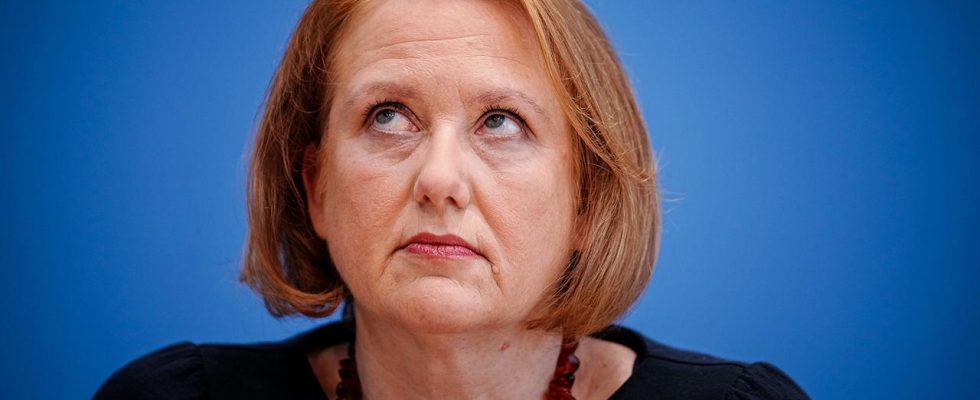Again and again, other figures on basic child security are circulating. How exactly Family Minister Paus calculates the costs for the project remains vague. A calculation attempt.
Family Minister Lisa Paus says of herself that she has a very familiar relationship with numbers. You can believe that of the economics graduate – for years she worked in the Bundestag as spokeswoman for financial and tax policy for the Greens parliamentary group. In the case of the traffic light coalition’s largest socio-political project, which she was in charge of developing, the politician has to put up with the accusation that she is rather confusing with her many numbers: various numbers have been circulating for months about basic child security.
First, Paus estimated twelve billion euros annually for this. Then the medium-term financial planning of FDP Finance Minister Christian Lindner for the 2025 budget provided only two billion euros for this. On January 1, 2025, the payment of basic child security should start. However, it was already said when the budget paper was agreed before the summer break that this was initially only a placeholder number – the family minister should present more concrete number models by the end of August. How expensive it would also depend on the question of whether there would be more or fewer performance improvements for children at risk of poverty.
Paus repeatedly spoke of two to seven billion euros in new annual costs. An agreement was reached on Monday: Initially, there should only be around 2.4 billion euros for basic child security in the first year of payment in 2025 – not far from the number specified by Lindner and apparently far from Paus’ ideas. And that after months of arduous agreement between Lindner and Paus, in which Chancellor Olaf Scholz had to intervene several times. After a noisy final act, Paus stood there like the loser of the negotiation.
The FDP, on the other hand, celebrated the agreement – Lindner wanted above all an administrative reform and showed no understanding for a general expansion of services for needy children. The basic child security had already been negotiated in the coalition agreement – as a simplification and combination of various family policy benefits. For the FDP side, this is linked to the idea that the new instrument, without general performance improvements, will of course not cost much more than the state is already spending: for adolescents in the form of child benefits, child allowances in income tax, child supplements for low earners or citizen benefits for unemployed parents and those who top up their low income with citizen benefits.
Confusion continues
But the numbers game is apparently not over: Even after Monday’s agreement, the family minister expects “six billion euros and more” for the coming years. “If we then add the additional costs for the child benefit increases that have already taken place, the higher child benefit and future child benefit increases, we are already well over ten billion euros,” said Paus on Thursday.
From the Ministry of Family Affairs it is said that by 2028 6.3 billion euros per year will probably be necessary – this is also in the draft bill of your house, which dem ARD Capital Studio present. The draft is currently in the association hearing and should be in the cabinet the week after next. The higher sum is calculated from the estimated additional expenses of up to 5.74 billion euros and the annual administration costs of 500 million euros.
Paus assumes that in the first year of basic child security, only 47 percent of those entitled to benefits will be reached – this includes low-income working parents and self-employed people who have rarely claimed benefits up to now. That is why there are only 2.4 billion euros in the law for the entry year 2025.
But the idea of the socio-political reform is to reach as many entitled persons as possible. According to Paus, if four out of five eligible children received the additional child allowance that depends on the parents’ income, that would be six billion. Paus’ draft law calculates that this 80 percent will be reached no later than the fourth year after its introduction – i.e. in 2028.
Isn’t Paus the secret winner?
The numbers can be confusing – also because they are only estimates. It remains unclear for future calculations how many parents actually access basic child security. Paus argues, for example, that more eligible parents are claiming the money because the stigma of “welfare” is gone. Because around 1.9 million children would get out of the citizen’s allowance.
If it were 90 percent of parents and beneficiaries, according to information from tagesschau.de the federal budget as of today probably even costs 7.5 billion euros. However, according to the Ministry, only an estimated 35 percent of the child allowance for low earners is used. These hitherto low retrieval rates show that the applications have so far been too unknown or too complicated. This is exactly what the traffic light coalition wants to change with the more easily accessible basic child security.
The more successful the project is, the more Lindner will come under pressure with his federal budget. The previous bill, which Lindner is of course familiar with, clearly provides for this option as a claim for payment. When asked whether she would then have to cut other items in her household in the future, the more expensive the basic child security became, Paus said: This link did not exist in her agreement with Lindner. Should the law come into force in its current form, the FDP will not be able to demand an absolute spending limit.
The exact amount of the basic child security cannot simply be precisely calculated a year and a half in advance – it has not yet been determined because the amount depends on other state payments, which are constantly being adjusted to the current cost of living. The new rule sets also depend on the socio-cultural subsistence level, which is currently being recalculated.


